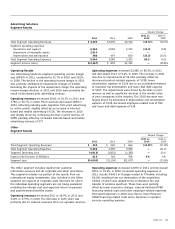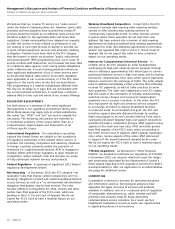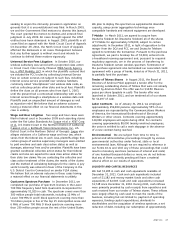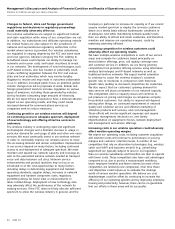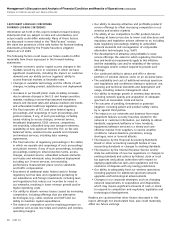AT&T Wireless 2011 Annual Report Download - page 48
Download and view the complete annual report
Please find page 48 of the 2011 AT&T Wireless annual report below. You can navigate through the pages in the report by either clicking on the pages listed below, or by using the keyword search tool below to find specific information within the annual report.
Management’s Discussion and Analysis of Financial Condition and Results of Operations (continued)
Dollars in millions except per share amounts
46 AT&T Inc.
contend that the cash reimbursement formerly paid to retirees
living outside their company’s local service area, for telephone
service they purchased from another provider, is a “defined
benefit plan” within the meaning of ERISA. In October 2006,
the court certified two classes. In May 2008, the court ruled
that the concession was an ERISA pension plan. In May 2009,
we filed a motion for reconsideration with the trial court.
That motion was granted in January 2011, and a final
judgment was entered in our favor. Plaintiffs have appealed
the judgment to the Fifth Circuit Court of Appeals.
In June 2011, the Fifth Circuit Court of Appeals held that
a similar cash reimbursement program currently offered
to out-of-region retirees of BellSouth Corporation (BellSouth)
is not a defined benefit plan. Plaintiffs in that case filed a
petition in the United States Supreme Court for a writ of
certiorari which the Supreme Court denied in December 2011.
The Supreme Court’s decision lends significant support to our
belief that an adverse outcome having a material effect on
our financial statements in this case is unlikely, but we will
continue to evaluate the potential impact of this suit on our
financial results as it progresses.
NSA Litigation Twenty-four lawsuits were filed alleging that
we and other telecommunications carriers unlawfully provided
assistance to the National Security Agency in connection
with intelligence activities that were initiated following the
events of September 11, 2001. In the first filed case, Hepting
et al v. AT&T Corp., AT&T Inc. and Does 1-20, a purported
class action filed in U.S. District Court in the Northern
District of California, plaintiffs alleged that the defendants
disclosed and are currently disclosing to the U.S. Government
content and call records concerning communications to
which Plaintiffs were a party. Plaintiffs sought damages,
a declaratory judgment and injunctive relief for violations
of the First and Fourth Amendments to the U.S. Constitution,
the Foreign Intelligence Surveillance Act (FISA), the Electronic
Communications Privacy Act and other federal and California
statutes. We filed a motion to dismiss the complaint.
The United States asserted the “state secrets privilege”
and related statutory privileges and also filed a motion
asking the court to dismiss the complaint. The court
denied the motions, and we and the United States
appealed. In August 2008, the U.S. Court of Appeals for
the Ninth Circuit remanded the case to the district court
without deciding the issue in light of the passage of the
FISA Amendments Act, a provision of which addresses the
allegations in these pending lawsuits (immunity provision).
The immunity provision requires the pending lawsuits to
be dismissed if the Attorney General certifies to the court
either that the alleged assistance was undertaken by court
order, certification, directive or written request or that
the telecom entity did not provide the alleged assistance.
In September 2008, the Attorney General filed his certification
and asked the district court to dismiss all of the lawsuits
pending against the AT&T Inc. telecommunications companies.
The court granted the Government’s motion to dismiss and
entered final judgments in July 2009. In addition, a lawsuit
If either the projected rate of long-term growth of cash
flows or revenues declined by 1%, or if the discount rate
increased by 1%, the fair values of the wireless FCC
licenses, while less than currently projected, would still
be higher than the book value of the licenses. The fair
value of the licenses exceeded the book value by more
than 25%.
We review customer relationships and other long-lived
assets for impairment whenever events or circumstances
indicate that the carrying amount may not be recoverable
over the remaining life of the asset or asset group.
To determine that the asset is recoverable, we verify that
the expected undiscounted future cash flows directly
related to that asset exceed its book value.
We evaluate our investments to determine whether
market declines are temporary and accordingly reflected
in accumulated other comprehensive income, or other-
than-temporary and recorded as an expense in other
income (expense) in the consolidated income statements.
This evaluation is based on the length of time and the
severity of decline in the investment’s value. In 2011 and
2010, we identified an other-than-temporary decline in
the value of immaterial equity method investments and
various cost investments.
Income Taxes Our estimates of income taxes and the
significant items giving rise to the deferred assets and
liabilities are shown in Note 10 and reflect our assessment
of actual future taxes to be paid on items reflected in the
financial statements, giving consideration to both timing
and probability of these estimates. Actual income taxes
could vary from these estimates due to future changes in
income tax law or the final review of our tax returns by
federal, state or foreign tax authorities.
We use our judgment to determine whether it is more
likely than not that we will sustain positions that we
have taken on tax returns and, if so, the amount of benefit
to initially recognize within our financial statements.
We regularly review our uncertain tax positions and adjust
our unrecognized tax benefits (UTBs) in light of changes
in facts and circumstances, such as changes in tax law,
interactions with taxing authorities and developments in
case law. These adjustments to our UTBs may affect our
income tax expense. Settlement of uncertain tax positions
may require use of our cash.
New Accounting Standards
See Note 1 for a discussion of recently issued or adopted
accounting standards.
OTHER BUSINESS MATTERS
Retiree Phone Concession Litigation In May 2005, we were
served with a purported class action in U.S. District Court,
Western District of Texas (Stoffels v. SBC Communications
Inc.), in which the plaintiffs, who are retirees of Pacific Bell
Telephone Company, Southwestern Bell and Ameritech,





